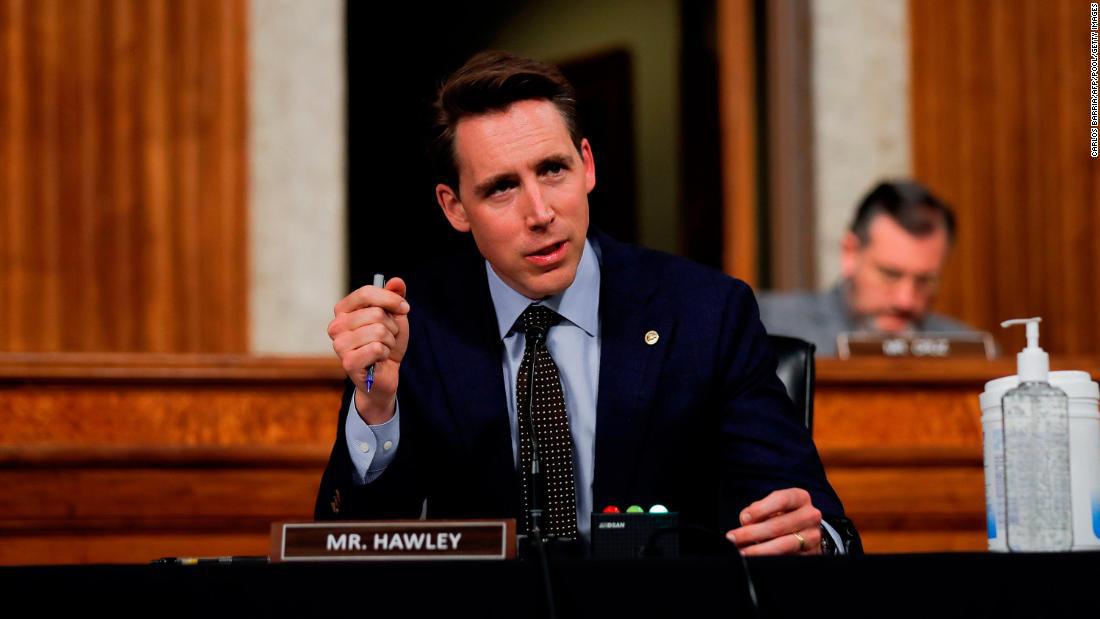Possible last resort to challenge Biden's 4:15 win
(CNN) ––
Josh Hawley, a Republican senator from Missouri, said Wednesday that he will object when Congress counts the Electoral College votes next week.
A measure that will force legislators, both in the House of Representatives and the Senate, to vote if they accept the results of the victory of the president-elect, Joe Biden.
Hawley is the first senator to announce his plans to challenge the results.
Which is significant because a member of the House of Representatives and one of the Senate are required to file an objection when Congress counts the Electoral College votes on January 6.
LEE: Some Republicans plan to contest the victory in the Biden Electoral College.
Here's what happened when Democrats challenged Bush's re-election
However, the objection will not change the outcome of the elections.
It will only delay the inevitable ratification of Biden's victory in the November election over President Donald Trump.
Democrats will reject any objection in the House.
Additionally, several Republican senators have argued against an objection that will provide a platform for Trump's unfounded conspiracy theories, which they claim he stole the election.
Other senators can still join Josh Hawley's objection.
Furthermore, the measure will put many of the Republicans in the Senate in a difficult political position.
Precisely, it will force them to decide whether to side with Trump or with the popular will of the voters.
Senate Majority Leader Mitch McConnell privately urged Senate Republicans not to join the group of representatives he plans to object.
John Thune, another senior member of the leadership, publicly opposed the move.
Which prompted a reprimand from Trump on Twitter and the threat of a challenge in the primaries.
advertising
Sen. Josh Hawley, Republican of Missouri, speaks at a Capitol hearing earlier this year.
Trump has pushed for Congress to try to overturn the election result.
This, after his campaign's attempts to do so through the courts were repeatedly rejected.
McConnell made clear in his conference that objecting is an unsuccessful effort that will not only prolong the process, but will force many Republicans to vote against Trump when the procedure is complete.
McConnell's top aides have shared similar views with members of the Senate Republican Party, his aides say.
But that hasn't stopped several Republican senators from keeping the option open.
It's a choice that places them between McConnell, who will continue to serve as the party's leader in the Senate and the highest-ranking Republican in the country, and Trump, who will soon leave office, but whose power within the party, especially with his base. , remains unquestionable.
LOOK: Congress has the next (and last) vote in the 2020 elections. This is how it works
There is no evidence of widespread fraud in the elections.
Nor, in the statement explaining his decision to object, did Josh Hawley present allegations of widespread fraud.
The senator claimed that some states, like Pennsylvania, did not follow their own laws.
Although, issues related to Pennsylvania's vote-by-mail rules were litigated before the election.
Hawley also complained about the way social media companies, such as Facebook and Twitter, handled content related to the elections.
"I cannot vote to certify the Electoral College results on January 6, not to mention the fact that some states, especially Pennsylvania, did not follow their own state election laws," Hawley said.
“At the very least, Congress should investigate allegations of electoral fraud.
And take steps to ensure the integrity of our elections.
But Congress so far has not acted.
Josh Hawley also cited previous Democratic objections during the Electoral College vote count.
In that sense, he pointed out that just as Democrats had a "right to do it," "now those of us concerned about the integrity of this election have the right to do the same."
Republican congressman asks Pence to ignore electoral college results 2:31
If an objection by a legislator is filed in both the House and Senate during the joint session of Congress, the two houses separate and debate the matter for two hours.
This, before voting if the objection is upheld.
Rep. Mo Brooks, R-Alabama, is leading the effort to object in the House of Representatives.
Earlier this month, he noted that Republicans are considering opposing six states that Biden won.
Which means up to 12 hours of debate, which would turn the process into a political circus.
And that could even be extended to a second day of debate.
House Democrats opposed Trump's victory in several states in 2017. Also, President George W. Bush's victory in Florida in 2001, but no senators joined them and the effort died.
The last time the cameras voted on an objection was in 2005. At that time, then-Sen.Barbara Boxer, a Democrat from California, joined then-Rep. Stephanie Tubbs Jones, a Democrat from Ohio, in opposing Bush's victory. in Ohio.
Hawley cited the objection in his statement Wednesday.
But Boxer told CNN earlier this month that the circumstances of the objection were completely different from the GOP's efforts to overturn Biden's election victory.
“Our intention was not to reverse the election in any way.
Our intention was to focus on voter suppression in Ohio, ”said Boxer, who retired from the Senate.
“They are talking about the vote that the presidency was stolen from Donald Trump.
It's not even a close comparison.
United States Congress 2020 United States Elections Joe Biden Josh Hawley









